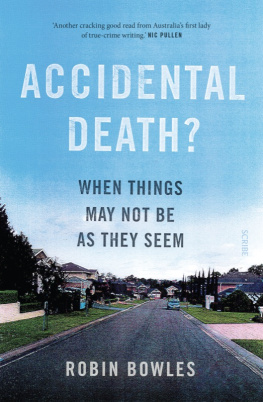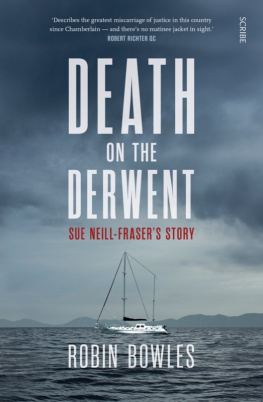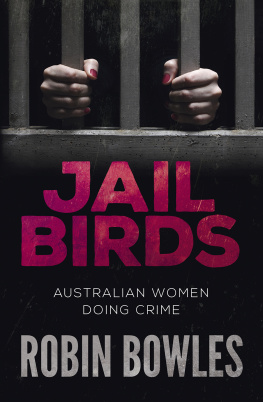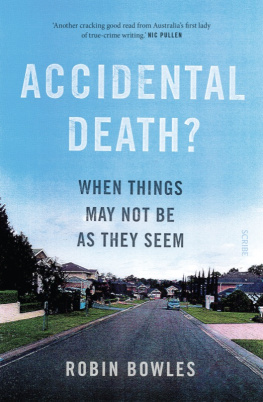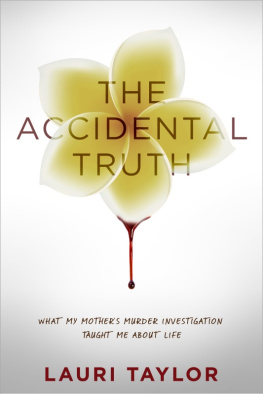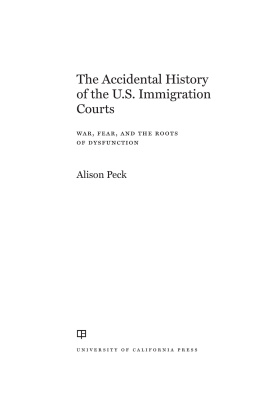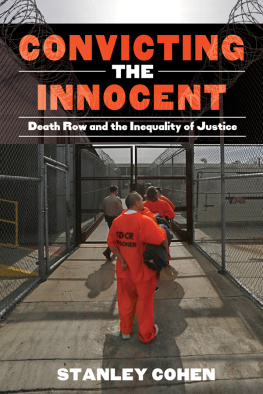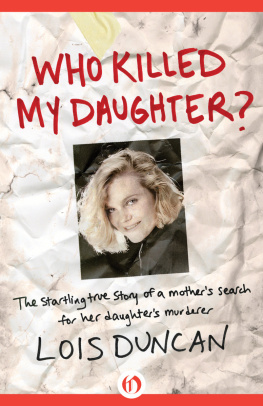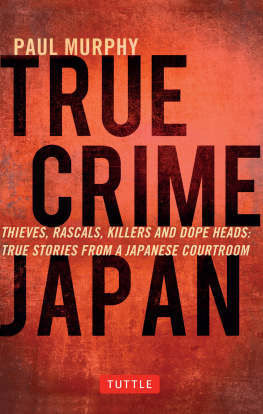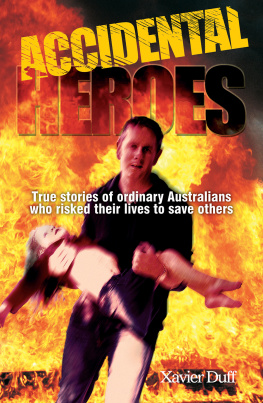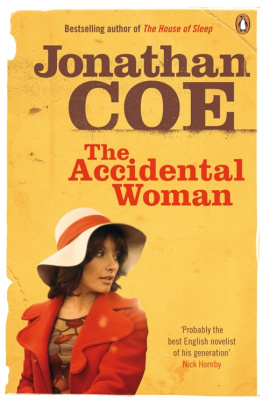
ACCIDENTAL DEATH
Robin Bowles is the author of twelve best-selling true crime books, including the definitive books on the Jaidyn Leskie murder, Justice Denied , and the disappearance and alleged murder of British tourist Peter Falconio, Dead Centre . She lives and writes in Melbourne.
Scribe Publications
1820 Edward St, Brunswick, Victoria 3056, Australia
2 John St, Clerkenwell, London, WC1N 2ES, United Kingdom
Published by Scribe 2016
The moral rights of the author have been asserted.
Copyright Copyright FUNKY P/L 2018
All rights reserved. Without limiting the rights under copyright reserved above, no part of this publication may be reproduced, stored in or introduced into a retrieval system, or transmitted, in any form or by any means (electronic, mechanical, photocopying, recording or otherwise) without the prior written permission of the publishers of this book.
Thanks to the Supreme Court of Victoria, the Magistrates Court of Tasmania, the Tasmanian Coroners Court, and the NSW Coroners Court for supplying transcripts and findings. Some transcripts have been edited for brevity and fluency, but the results remain true to the words spoken.
Image for the chapter KILLER COP by GlebSStock/Shutterstock.com; all other images supplied.
9781925322521 (paperback edition)
9781925548853 (e-book)
A CiP entry for this title is available from the National Library of Australia.
scribepublications.com.au
scribepublications.co.uk
Dedicated to the brave and caring members
of the State Emergency Services, who are volunteers;
and other first attenders police and ambulance officers
who often go home with tears in their eyes.
CONTENTS
INTRODUCTION
Dear readers,
This new book contains a collection of stories about sudden events that have changed the course of peoples lives. One day, everything is on track and life is great; then the police knock at the door; a person loses his temper; loved ones are suddenly no more their beds undisturbed, their voices no longer heard, their smiles just a memory, their places at table empty.
Why have I chosen to write these stories when I am best known for writing about murder and other heinous crimes? Many people over the last 20 years have asked me to tell their stories, but its not always possible. I dont have enough time in my year; sometimes the story isnt detailed enough for a book, which needs lots of layers; at other times, what happened is too awful, or the reasons too simple to justify a full-scale investigation. I do collect these stories, though, research them, write them down, and keep them in a drawer, until I think there might actually be a book in them after all.
A compendium of stories like this is more demanding to write than a single case, because each story has to be researched in detail there are survivors, investigators, witnesses, families, police, and legal people in practically every case. But hey, I love meeting people, and Im honoured that they trust me with their thoughts and feelings. Besides, Miss Deva, my doggie sleuthing companion, needs to get out from her bed beside my desk every now and then and do some exploring.
In this collection of stories, police investigations still happen, as the police are a suspicious bunch and not all that open-minded about accidents. Several of the accidents, on investigation, turned out not to be accidents at all. Some of them were crimes. Some of the accidents remain unexplained, unsatisfactorily resolved in the eyes of the victims left behind. Others have been shown, after detailed investigation, to be just what they appeared to be.
In some cases, the relatives of a person killed cannot accept an outcome even after a thorough investigation. They dont think its just or fair. They want someone punished for taking away the person they loved, even if it happened by accident. Almost every day, I encounter survivors who just cant accept the courts decisions and admit that the person who has caused them so much grief is also a victim of the accident. Sorry just doesnt cut it, somehow.
The first story in Accidental Death? is called Murky Waters. When you read it, youll understand the title. The intriguing thing to me was that on the face of it, this death seemed open-and-shut. A 61-year-old woman swimming in flat water at a safe beach had got into difficulties just out of her depth. She was rescued by another beachgoer and her son-in-law, both of who were at least 50 metres away on the shore, but they couldnt revive her and she died. A lay-down-misre for accidental death or was it?
After the drowning, suspicion and innuendo flowed around the son-in-law, who stood to profit financially from the victims death. Rumours also flew about his alleged poor treatment of her before she died. Could he have somehow contributed to her drowning? I had trouble understanding how someone could contribute to a drowning when he hadnt got his feet wet until he saw that help was needed and had then rendered assistance. The Coroner had trouble with it as well and took nearly four years to deliver his finding, which still left questions unanswered.
The title Killer Cop might conjure an image of a rampaging badass cop from some awful action movie, weighed down with assault gear and brandishing a semi-automatic weapon. Think again. This story is about a freak accident of the kind that never enters your mind as you leave home in the morning but will put you in the lock-up by the end of the day. The events described here occurred before one-punch legislation was enacted in every Australian state except Tasmania. The man at the centre of the story has just served his 15-year sentence, completing parole in March 2017. His story is about how a law-abiding upright member of the community changed the course of his own and many others lives in a split second after a freak accident. In this story, names have been changed to afford privacy to the man and his family in the new lives they have made, but the facts remain.
Due Process is a story that has followed me for a number of years. Its about a well-connected and talented doctor in Melbourne who accidentally lost two wives in the space of ten years, and then married again. No blame has ever been attached to his actions in this regard, but as Lady Bracknell says in The Importance of Being Earnest , To lose one parent may be regarded as a misfortune; to lose both looks like carelessness.
The doctor, an immunologist, lost his first wife, who was pregnant, when she allegedly choked on her vomit as a result of extreme morning sickness. Just ten years later, his second partner died from a sudden onset of life-threatening gastroenteritis. The father of the second partner was unwavering in trying to discover his daughters cause of death over several years. There was a police investigation, an inquest, Ombudsmans representations, government intervention, an ex gratia payment from the Victorian government to make him go away, but nothing deterred this father until death overtook him as well, his quest to find the cause of his daughters accidental death unresolved. It is still not satisfactorily explained.
The next story is about the loss of a child. Every day, we read in the papers stories about accidents on the roads: people slamming into trees, getting clobbered on pedestrian crossings, or being hit by a drunk or careless driver. The stories dont mean much. Each death is another statistic: one more person killed on the road, one more statistic for the annual road toll. The victims leave home in their cars and they never come back. Sometimes, the people who caused those accidents are investigated by police and charged; sometimes, they are investigated and not charged. Behind every statistic, though, is a crushing emotional, psychological, and personal impact on family and friends.
Next page
